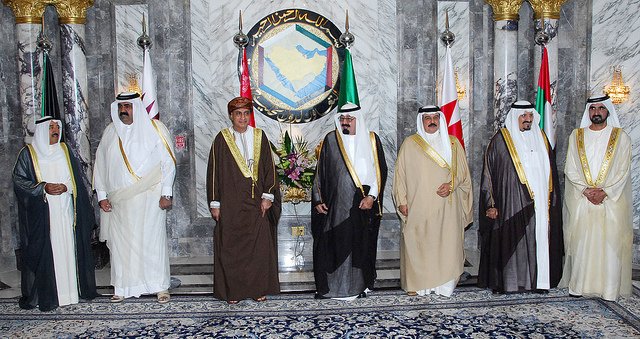by Emile Nakhleh
Yesterday’s public announcement by Saudi Arabia, the United Arab Emirates (UAE) and Bahrain that they’re withdrawing their ambassadors from Qatar signals a serious rift within the Gulf Cooperation Council (GCC). The seismic regional changes that have occurred since the establishment of the GCC 33 years ago will likely torpedo this tribal organization.
The stated reason for the ambassadorial recall is Qatar’s perceived support of the Muslim Brotherhood, which the three states view as a threat to their rule. Yet, the other two GCC members — Kuwait and Oman — did not support the move.
Saudi Arabia is angry at Qatar for striking an independent foreign policy course in responding to Arab upheavals in the past three years. The Saudis are lashing out probably because of their arguably waning influence in the region. For example, they failed to get a unanimous GCC support for sending troops to Bahrain to quell the anti-regime uprising in 2011.
They were equally unable to sell the call for unification of the GCC states. Only the Bahraini King supported the Saudi position, which forced them to shelf the proposal.
The Saudis have also disagreed with Qatar’s position on Iran and Syria. As the largest and most powerful member of the GCC, Saudi Arabia resents Qatar’s larger than life posture in the region and internationally. Riyadh’s rulers are wary of Doha’s pro-active search for modernity, Western education, and political and ideological pragmatism. Qatar’s satellite news station Al Jazeera has been a thorn in the Saudi and Bahraini side.
The GCC came into being May 26, 1981 for the sole purpose of preserving the tribal, Sunni and hereditary family rule in the Gulf Arab states and countering perceived rising threats.
At the time those threats included the Soviet invasion of Afghanistan, the Islamic revolution in Iran, the Iraq-Iran war, and the Israeli invasion of Lebanon. Ruling Sheikhs and Emirs viewed the rising wave of terrorism in the region as coming from Iran and its Shia supporters across the Gulf and beyond.
The establishment of the Islamic Republic in Iran and the Soviet invasion of Afghanistan forced Gulf rulers to turn to Sunni Islam, including the Muslim Brotherhood, for protection against the “atheist” Soviet Union in Afghanistan and the “Safavi, Persian menace.”
They preached and bankrolled Salafi Sunni jihad against both perceived enemies. By recasting the Muslim Brotherhood (MB) as the current enemy, these rulers are being seen as hypocritical and shortsighted. They are also playing a dangerous game.
Bahrain, for example, has promoted a Sunni Islamic ideology at home that is well grounded in the MB as a line of defense against the Shia opposition. Over the years, some Bahraini political and business Sunni leaders have established close relations with the MB, regionally and internationally, according to media reports.
The Saudis and the Bahrainis are also financing Sunni Salafi jihad in Syria against the Assad regime. Earlier they supported similar groups in Iraq against the Shia power structure. In fact, in the past two years, several radical Sunni activists from Bahrain went to Syria to wage jihad against Assad, presumably with the approval of the Bahraini authorities.
The Saudi, UAE and Bahraini anger at Qatar is yet another manifestation of the tensions that have simmered for years within the GCC. While they recognized growing threats to their rule in the early 1980s, they disagreed even then on how to respond to those threats.
The Al Khalifa regime, especially, finds itself in a dilemma: Supporting the Egyptian military junta against the MB, and at the same time relying on pro-MB activists to fight the Shia opposition and Iran, which they blame for the unrest in Bahrain.
Oman, Qatar, and Kuwait, on the other hand, are pursuing active political and economic relations with Tehran based on pragmatism and mutual economic interests.
Despite their annual summitry and the public rhetoric of Gulf unity, GCC rulers in the past thirty years have pursued their respective national interests separately with barely a nod to the organization. On very few occasions they acted collectively under the umbrella of the GCC security agreement.
The May 1981 GCC agreement stressed the importance of cooperation in education, manpower training, and economic diversification. But the GCC has been unable to transcend security and establish regional cooperative working arrangements in other areas.
GCC states shied away from economic complimentarity, as envisioned in the original agreement, and established separate airlines, banking systems, investment corporations, and media enterprises. Although they cling to authoritarian hereditary family rule, Kuwait has established a pseudo-democracy. Bahrain had a brush with representative democracy in the early 1970s but scuttled the experiment shortly thereafter. Each state devised a political system that is commensurate with its perceived cultural and demographic particularities regardless of their commitment to the GCC.
When I was doing research for my book on the GCC in the mid-1980s, I asked a successful Arab Gulf businessman what he thought of the GCC. He responded colloquially with one word, “Hatchi” meaning “just talk.”
A real gap exists in the minds of Gulf citizens between the rhetoric of the GCC as a collective organization and its social and economic accomplishments. While the member states have advanced in their individual pursuits, the GCC seems to be withering as an organization.
American and Western policymakers regularly cite the GCC in their public statements, but in reality they deal with member countries as separate states with little consideration of the organization.
Although Qatar is being accused of promoting the Muslim Brotherhood, especially providing a home for the televangelist preacher-scholar Yusif al-Qaradawi and his family enterprises, the tensions between Qatar and Saudi Arabia are much deeper than al-Qaradawi and Al Jazeera, which carries his programs.
Instead of blaming Qatar and recalling their ambassadors, Saudi Arabia, the UAE, and Bahrain should address their poor human rights record at home and respond to their peoples’ demands for genuine reform and social justice.






Interesting article, thank you. I think your last paragraph puts the spotlight on the main problem that the M.E. faces today. That being denial at home. Always easier to point the finger toward another, then turning that same finger at who owns the finger. I wonder what the rwesult[s] might be to recalling the Ambassadors, if anything but posturing?